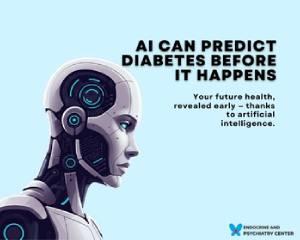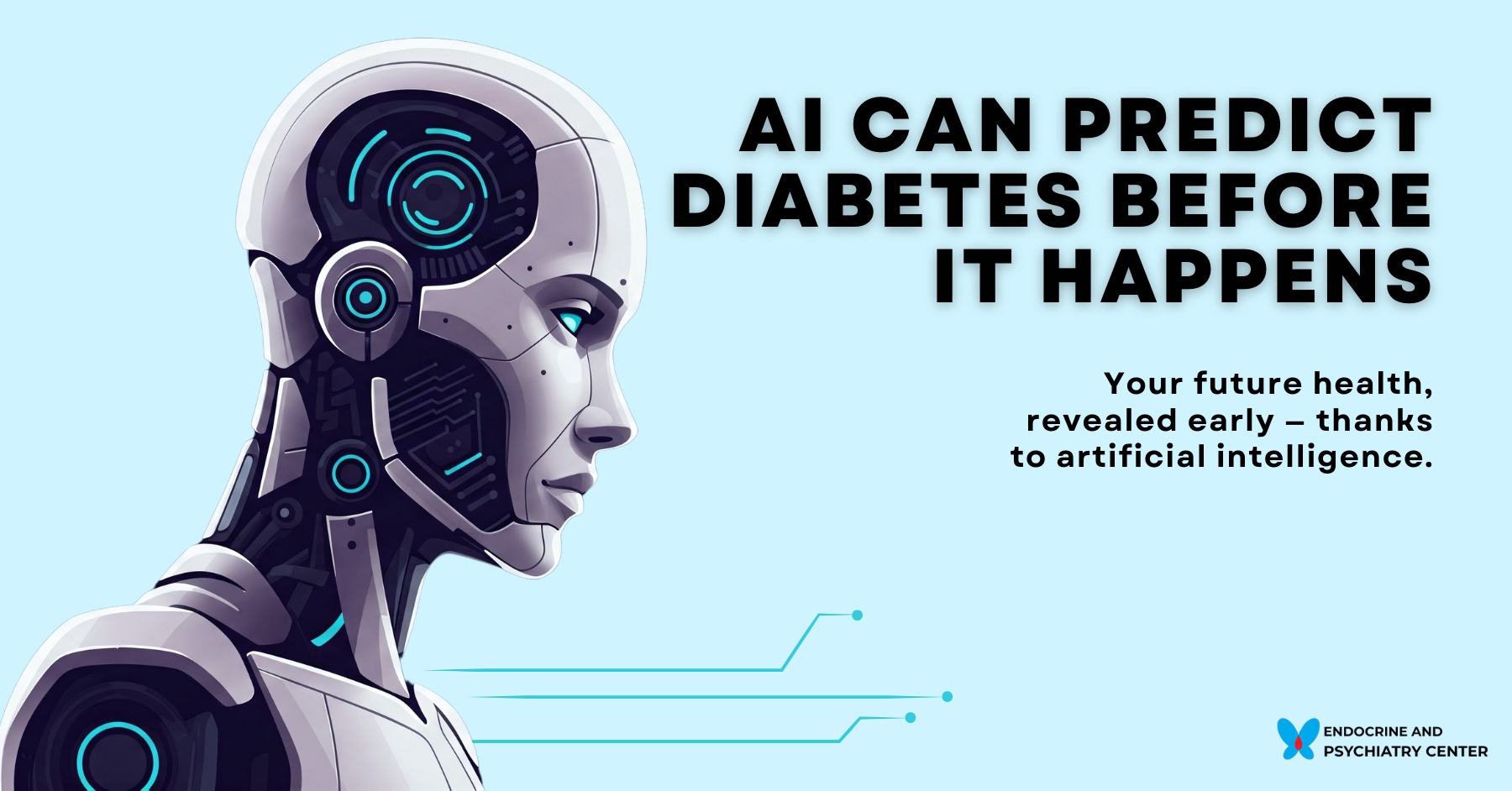- About Us
- Locations
- Meet the Team
-
Patient Resources
-
-
Patient Information
-
-
-
Services
-
-
All Services
-
Proudly Part of Privia Health

Can a Computer Tell if You’ll Get Diabetes? The Answer Might Surprise You!

A New Way to Stop Diabetes Before It Starts
Imagine if your doctor could tell you today whether you might get type 2 diabetes 5 or even 10 years from now. Sounds like science fiction, right? But thanks to artificial intelligence (AI), this is quickly becoming real life. AI is a type of smart computer system that can look at your health data and find patterns that humans might miss.
In this blog, we’ll explain how AI is helping doctors spot the risk of diabetes early—sometimes even before symptoms show up. We’ll also talk about how this can help you and your family live longer, healthier lives.
What Is Type 2 Diabetes?
Before we get into the AI part, let’s talk about type 2 diabetes.
Type 2 diabetes is a health condition that happens when your body can’t use insulin properly. Insulin is a hormone that helps your body turn sugar from food into energy. When insulin isn’t working right, too much sugar builds up in your blood.
This can cause:
- Tiredness
- Frequent urination
- Blurry vision
- Cuts that take a long time to heal
- And even more serious problems like heart disease, kidney failure, and nerve damage
The good news? Type 2 diabetes is often preventable—especially if you catch it early.
What Is AI and How Does It Help?
AI stands for artificial intelligence. It’s like giving a computer a brain to learn and make decisions. AI systems can look through a lot of health records—like blood tests, blood pressure, weight, and even things like how much sleep you get. Then, the computer finds patterns and tells your doctor if you’re at risk of getting type 2 diabetes.
Here’s how AI helps:
- Fast: It can go through thousands of records in seconds.
- Smart: It sees patterns that humans may not notice.
- Personalized: It gives information based on your body and lifestyle, not just averages.
Think of AI like a super-powered assistant for your doctor. It doesn’t replace your doctor—it helps them make even better choices for your care.
What Kind of Information Does AI Use?
You don’t need to wear a robot suit or plug into a computer. AI uses the kind of information your doctor already collects, such as:
- Blood sugar (glucose) levels
- Cholesterol
- Weight and body mass index (BMI)
- Blood pressure
- Age and family history
- Exercise habits
- Diet
Even things like how often you go to the doctor or if you take certain medications can be useful. The more data the AI has, the better it can predict your risk.
What Are the Benefits of Knowing Your Risk Early?
If you find out you’re at risk before you have diabetes, you can take steps to prevent it. This is where the real magic happens. You don’t have to wait until you’re sick to take action.
You Can Make Small Changes That Really Help:
- Start a daily walk—even 15 minutes helps
- Eat more fruits and vegetables
- Cut down on sugary drinks like soda and juice
- Lose just 5–10% of your body weight (this makes a huge difference)
- Sleep better and manage stress
When you know your risk, these changes feel more important—and they work better too. In fact, research shows that people who make lifestyle changes early can cut their risk of diabetes in half.
Who Should Ask About AI Diabetes Risk Tests?
You might be wondering, “Is this something I should ask my doctor about?” The answer is yes—especially if any of these sound like you:
- You have a family history of diabetes
- You are overweight or obese
- You’re over the age of 40
- You had gestational diabetes during pregnancy
- You have high blood pressure or high cholesterol
- You’re tired a lot or get thirsty all the time
Even if you feel fine, it doesn’t hurt to ask. AI might spot something before symptoms ever show up.
Is AI Already Being Used by Doctors?
Yes! Right now, hospitals and research centers are using AI to help predict and manage diabetes. Some companies are even building apps that connect to your phone or smartwatch to track your health.
AI can also help with:
- Reminding you to take your medicine
- Tracking your weight or steps
- Warning your doctor if your blood sugar is too high or low
- Suggesting food and exercise tips based on your data
In the future, more doctors will use AI during regular check-ups. It might even become a standard part of your health screening—just like checking your blood pressure.
What About Privacy? Is My Data Safe?
That’s a great question—and an important one.
Any time we use computers and health data, we want to make sure everything stays private. Most hospitals and doctors follow very strict rules to protect your information.
Also:
- The AI doesn’t know your name—it just sees numbers and patterns.
- Your personal information is not shared without your permission.
- You can always ask how your data is used and stored.
If you ever feel unsure, ask your doctor or clinic to explain their privacy policy. You have the right to feel safe and informed.
What If I’m Already Diagnosed With Type 2 Diabetes?
If you already have diabetes, AI can still help! In fact, it can be a powerful tool to help manage the condition better.
For example:
- AI can track your daily blood sugar and warn you of dangerous changes
- It can help your doctor adjust your medications
- Some apps give real-time tips on meals, exercise, or stress management
Even if you’ve had diabetes for years, AI can help improve your quality of life and reduce the risk of complications.
What Can I Do Today?
Here’s how you can get started on your journey to better health with AI:
- Talk to Your Doctor: Ask if they use or recommend AI-based tools to check for diabetes risk.
- Know Your Numbers: Make sure you’ve had recent checks for blood sugar, cholesterol, and blood pressure.
- Make Healthy Changes: Even small steps—like walking after dinner or drinking more water—can help.
- Use Apps Wisely: Some health tracking apps now use AI. Ask your doctor which ones are safe and helpful.
- Stay Curious: Keep learning! The more you understand your health, the better choices you can make.
The Future Is Bright—and It Starts Now
AI is changing the way we think about health. Instead of waiting until we’re sick, we can act early. For people at risk of type 2 diabetes, this is a game-changer.
Imagine a world where your doctor says, “Let’s work together now to stop diabetes before it starts.” That world is already here—and AI is making it possible.
Final Thoughts
You don’t need to be a tech expert to benefit from AI. All you need is the right support, a little
information, and the willingness to take action. Talk to your doctor about AI tools that can help
you. It could be the key to a longer, healthier life.
👣 Take the Next Step:
Worried about your risk of diabetes? Schedule a check-up and ask your doctor about AI-based
risk prediction. It’s simple, safe, and could change your life